|
|
|
Sort Order |
|
|
|
Items / Page
|
|
|
|
|
|
|
| Srl | Item |
| 1 |
ID:
142103


|
|
|
|
|
| Summary/Abstract |
Since the early 1960s, China has been enhancing national power and, in this regard, Chinese space capabilities play a pivotal role. Today, China is second among spacefaring counties, behind the United States, as a measure of human spaceflight, as well as in commercial and military satellite systems. Chinese space technology, in contrast to developed nations, is comparatively cost-effective; China is sharing it with developing nations for their space programs, consequently expanding the pool of spacefaring states. Most significantly, China’s nuclear, military, and space capabilities provide it with an opportunity to reassert itself as a global power, enhancing its strategic outreach and preventing adversaries from contemplating strategies against it.
|
|
|
|
|
|
|
|
|
|
|
|
|
|
|
|
| 2 |
ID:
142104
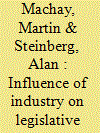

|
|
|
|
|
| Summary/Abstract |
This article explores economic factors that help to explain Congressional support for NASA Authorization Acts and issues of U.S. federal space funding. Three economic factors related to political opportunism are identified and discussed in detail. Across the board, NASA Centers are a significant factor in shaping voting preferences, suggesting that the NASA presence itself plays an important role in influencing legislators. Meanwhile, other forms of economic opportunism based on the relative importance of the space and aircraft manufacturing industries in a given state and the amounts of NASA procurements are factors, but only in a more limited sense. This supports the concept that economic opportunism does influence legislative voting behavior on NASA Authorization Acts, though the bulk of the impact appears to be indirectly via NASA centers.
|
|
|
|
|
|
|
|
|
|
|
|
|
|
|
|
| 3 |
ID:
142102
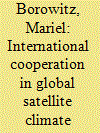

|
|
|
|
|
| Summary/Abstract |
A lack of consensus on the requirements for adequate monitoring of climate change by satellites makes it difficult to identify gaps in the collection of climate-relevant data and prevents national policy makers from taking into account global climate monitoring needs when planning the development of future satellites. Multiple international organizations undertake efforts to identify the high-level/system-level and technical requirements of such a system, and each of these efforts reveals gaps in global climate monitoring capabilities. These efforts require further coordination to achieve global consensus on the highest-priority monitoring needs. With regard to high-level requirements, this will require organizations to align and coordinate their efforts, considering both the most important types of measurements and the most efficient physical architecture for collection. Efforts at identifying detailed technical requirements for climate monitoring are duplicative and need to be consolidated. Coordination at the system level and consolidation at the technical level should be followed by prioritizing climate monitoring needs, allowing policy makers to invest in satellite systems that will realize the greatest contribution to global climate monitoring.
|
|
|
|
|
|
|
|
|
|
|
|
|
|
|
|
| 4 |
ID:
142100
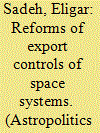

|
|
|
|
|
| Summary/Abstract |
This report on Reforms of Export Controls of Space Systems is based on meetings and interviews held in December 2014 with the U.S. Department of Commerce and the Bureau of Industry and Security (BIS) and the Office of National Security and Technology Transfers Controls therein. This was held on the basis of non-attribution to any of the individuals involved from the Department of Commerce, and the conclusions highlighted in the following are solely the views and interpretations of Eligar Sadeh.
|
|
|
|
|
|
|
|
|
|
|
|
|
|
|
|
| 5 |
ID:
142101


|
|
|
|
|
| Summary/Abstract |
In 2013, the Satellite Industry Association (SIA) submitted public comments recommending changes to and requesting clarifications on U.S. government proposals to modify the export-control regulations governing satellite technology. The comments represented a final stage of the decade-long effort to reform the restrictive export-control policy put in place in the late 1990s. To assist in constructing a transparent and effective regime that protects national security and U.S. competitiveness, SIA’s comments contained detailed recommendations to the State Department and Commerce Department that addressed highly technical concerns, attempted to harmonize confusing definitions, and requested additional clarity on jurisdictional questions. Taken in context, the filing represents a perspective on export control policy shared by the bulk of the U.S. satellite industry.
|
|
|
|
|
|
|
|
|
|
|
|
|
|
|
|
| 6 |
ID:
142098
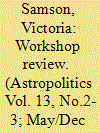

|
|
|
|
|
| Summary/Abstract |
Experts from U.S. government agencies that administer export controls of space systems and representatives from non-governmental organizations and think tanks were invited in December 2014 to participate in an invitation-only workshop co-hosted by the Secure World Foundation and Astroconsulting International to discuss export controls with a delegation of industry representatives from The Society of Japanese Aerospace Companies. The underlying question when working on export controls is, with the increased access to space and burgeoning role of the private sector in space, how do you regulate this and encourage industry without harming national security? It is difficult to do this while supporting the space industrial base, as export control is perceived as a necessary part of shoring U.S. national security and assuring a stable and predictable space environment. A serious challenge is determining which technologies should be controlled: where do you draw the line? This is particularly the case for space technologies, many of which are dual-use. Countries also have to be careful of unintended consequences. Export control restrictions are extremely challenging to get “just right” and, as a result, should be undertaken only after a considerable amount of discussion with all stakeholders, including input from industry, and when the government has a solid understanding of what it is trying to accomplish via export control protections. Otherwise, the domestic industry can unduly suffer with very little benefit to national security.
|
|
|
|
|
|
|
|
|
|
|
|
|
|
|
|
| 7 |
ID:
142099
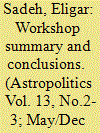

|
|
|
|
|
| Summary/Abstract |
This report is a follow-up to the previous review of the workshop on export controls of space systems. The focus is on key points put forward at the workshop and concluding observations.
|
|
|
|
|
|
|
|
|
|
|
|
|
|
|
|
|
|
|
|
|